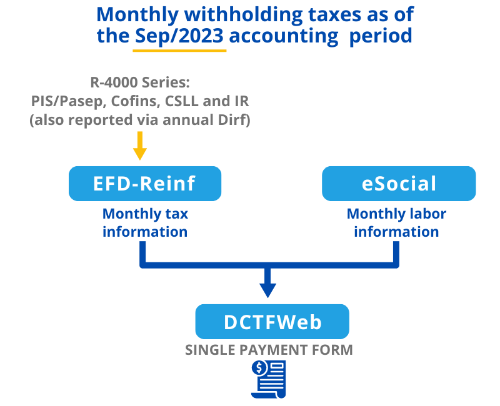
Startups in Brazil: an overview on entity types, business set up and tax planning
15/08/2023
Tax review: how it works and what benefits it entails
21/08/2023HIGHLIGHTS
EFD-Reinf 2023: be mindful of changes due to the R-4000 series of events
Information on Information on PIS/Pasep, Cofins, CSLL and IR, which was previously supplied on an annual basis using the Dirf, will be provided monthly through the EFD-Reinf
Updated October 11, 2023
The Digital Tax Bookkeeping for Withholding and Other Tax Information (EFD-Reinf) will soon undergo major changes, with the inclusion of federal taxes deducted at source in the so-called R-4000 series of events, starting September 2023.
There will be a definite impact on the companies’ routines, as data that used to be reported on an annual basis will now be requested by the tax authorities every month, marking another stage in the transition from the Withholding Income Tax Return – Dirf (which will be discontinued in 2025) to the EFD-Reinf. As a result, those required to supply information will need to accommodate their processes and systems to the new reporting requirements.
Starting September 21, 2023 (for events taking place as of September 1, 2023), a new information block on the EFD-Reinf is scheduled to take effect, with the R-4000 series. Find out what that means and other important aspects that deserve attention.
What is the EFD-Reinf?
Created in 2017, the EFD-Reinf has so far been used exclusively to provide information on Social Security Taxes (INSS). From September 2023, however, the bookkeeping system will include other tax withholdings.
EFD-Reinf: who is required to file?
The following are required to file the EFD-Reinf, even if they enjoy tax immunity or exemption:
- companies that provide and purchase services performed through labor outsourcing;
- legal entities required to deduct social security contributions (PIS/Pasep, Cofins and CSLL) at source;
- legal enetities opting to pay the Social Security Contribution on Gross Revenue (CPRB);
- legal entities classified as farm operators or agrobusinesses subject to paying the replacement social security contribution on gross revenue from the sales of rural goods;
- purchaser of rural goods;
- sports associations that maintain a professional soccer team and have received amounts from sponsorship, brand licensing, advertising, marketing and broadcasting of sporting events;
- sponsoring businesses that have allocated funds to a sports association that maintains a professional soccer team by way of sponsorship, brand licensing, advertising, marketing and broadcasting of sporting events;
- entities promoting sporting events held in Brazil, regardless of discipline, provided that at least one sports association that maintains a professional soccer team has ownership interest in the company; and
- legal entities and individuals who have made payments on which Income Tax has been withheld at source (IRRF) by themselves, on their own behalf or on that of a third party.
If no taxable event took place during the assessment period ("no turnover") there is no need to file the statement.
What is the deadline for filing the EFD-Reinf?
The EFD-Reinf must be filed with the Sped system on a monthly basis by the 15th day of the month following that to which the accounting records relate. Companies promoting sporting events, on the other hand, must submit their records within two working days of the event taking place.
With the publication of RFB Normative Ruling No. 2,163/2023, whenever the filing deadline falls on a non-business day for tax purposes, the corresponding submission will be postponed to the following business day.
| Thus, the first submission covering R-4000 information for events taking place from September 1, 2023, must be made by October 16, as October 15 falls on a Sunday. |
What EFD-Reinf changes will take effect as of September 2023?
The R-4000 series comes into effect for withholding tax invoices pertaining to:
- Withholding Income Tax (IRRF);
- Social Integration Program (PIS) / Public Service Employee Savings Program (Pasep);
- Contribution for Social Security Financing (Cofins);
- Social Contribution on Net Income (CSLL).
The withholding taxes above will be added to list of retentions that must be reported through the EFD-Reinf, which already includes the withholding of contributions payable to the Social Security Administration (INSS).
As with the eSocial, information reported through the EFD-Reinf is automatically entered into the DCTFWeb. The tax authorities' system receives the data, calculates the amounts payable and, only after the DCTFWeb has been filed is it possible to issue the corresponding payment slip for all these taxes, by generating a federal revenue payment form - Darf.
At the moment, taxes are withheld using separate forms. Starting September, with the inclusion of the R-4000 series in the EFD-Reinf, all such retentions will be consolidated into a single Darf issued via DCTFWeb. This means that, in a way, taxpayers will have to be extra mindful of the accuracy of the information supplied. Any rectification will require both forms to be amended and might lead to potential penalties.

Another aspect that warrants attention concerns registration data, as changes will be made to the codes used to report the nature of income. This is bound to affect management software and controls, so businesses must adjust their tools to the new situation.
In other words, companies must make the necessary adjustments to provide Income Tax and social contribution information on a monthly basis to their accountants or directly to the tax authorities, as appropriate. Priority should be given to the quality of the data supplied in order to prevent risks and tax liabilities.
| It is worth noting that companies will still be required to file the Dirf in 2024 to report information pertaining to the calendar year 2023 (2023 tax base to be checked against data submitted via EFD-Reinf in the same year). This requirement ends in 2025. Read more here. |
How to prepare your business?
Based on the understanding that the flow of tax information is becoming faster and that inspections will be more rigorous, taxpayers should:
-
Make internal adjustments to provide accounting and tax information in a more agile manner;
- Promote a change in the company culture to operate in line with the new requirements, both in terms of deadlines and information accuracy;
- Adjust their systems so they can make correct classifications;
- Work in conjunction with their accounting partners during this transitional stage to adapt to the new rules.
Partnership for a secure transition
DPC has been working on systemic improvements and is making the adjustments to the relevant processes to ensure a sound transition for its clients while ensuring their compliance.
In addition to its accounting and tax departments, DPC has a team dedicated to system parameterization, which is able to assess their customers’ needs and make the necessary adjustments to their ERP of choice to ensure good standing with the new requirements. Contact us at: dpc@dpc.com.br.
How DPC may help your company?
Domingues e Pinho Contadores has specialized team ready to assist your company.
Contact us by the e-mail dpc@dpc.com.br
See more
Sign up for our Newsletter:
Are you interested?
Please contact us, so we can understand your demand and offer the best solution for you and your company.

Rio de Janeiro
Av. Rio Branco 311, 4º e 10º andar - Centro
CEP 20040-903 | Tel: +55 (21) 3231-3700
São Paulo
Rua do Paraíso 45, 4º andar - Paraíso
CEP 04103-000 | Tel: +55 (11) 3330-3330
Macaé
Rua Teixeira de Gouveia 989, sala 302 - Centro
CEP 27910-110 | Tel: +55 (21) 3231-3700/p>



